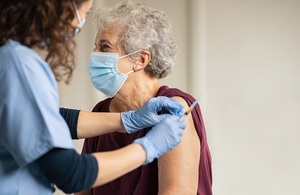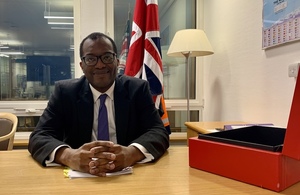More than 2.2 million people in UK receive first dose of COVID-19 vaccine
Press release
The number of people who have received the first dose of a COVID-19 vaccine between 8 December 2020 to Sunday 10 January 2021 is 2,286,572.

More than 2.2 million people in the UK have received the first dose of a COVID-19 vaccine, the latest figures show as the government begins daily publications on vaccination uptake.
The number of people who have received the first dose of a COVID-19 vaccine between 8 December to Sunday 10 January is 2,286,572.
The breakdown in each nation is:
- England: 1,959,151
- Scotland: 163,377
- Wales: 86,039
- Northern Ireland: 78,005
More than 2.6 million vaccine doses (2,675,213) have been administered overall in the UK – excluding the number of second doses in Scotland – over the same time period.
NHS England will publish a more detailed breakdown of their figures every week – starting from Thursday – which will include vaccinations in England by region.
The daily vaccination statistics are published daily on the COVID-19 dashboard.
The NHS will be offering a vaccination to everyone in the top four priority groups as set out by the Joint Committee on Vaccination and Immunisation by 15 February. This includes:
- all residents in a care home for older adults and their carers
- all those 80 years of age and over and frontline health and social care workers
- all those 75 years of age and over
- all those 70 years of age and over and clinically extremely vulnerable individuals
The prioritisation of vaccinations is in accordance with the advice of the Joint Committee on Vaccination and Immunisation (JCVI), the independent experts who advise government on which vaccine(s) the UK should use and provide advice on prioritisation at a population level.
The committee has advised that the first priorities for any COVID-19 vaccination programme should be the prevention COVID-19 mortality and protection of health and social care staff and systems. Secondary priorities could include vaccination of those at increased risk of hospitalisation and at increased risk of exposure, and to maintain resilience in essential public services.
Taking this into account they have listed 9 priority cohorts. These include:
- residents in a care home for older adults and their carers
- all those 80 years of age and over and frontline health and social care workers
- all those 75 years of age and over
- all those 70 years of age and over and clinically extremely vulnerable individuals
- all those 65 years of age and over
- all individuals aged 16 years to 64 years with underlying health conditions which put them at higher risk of serious disease and mortality
- all those 60 years of age and over
- all those 55 years of age and over
- all those 50 years of age and over
The first 7 vaccination sites opening this week are:
- Ashton Gate in Bristol (South West)
- Epsom Racecourse in Surrey (South East)
- Excel Centre in London (London)
- Centre for Life (North East and Yorkshire)
- Eithiad Tennis Club in Manchester (North West)
- Robertson House in Stevenage (East of England)
- Millennium Point in Birmingham (Midlands)
Published 11 January 2021
